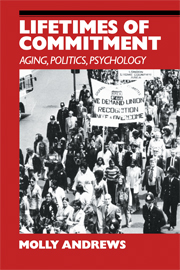Book contents
- Frontmatter
- Contents
- Acknowledgements
- 1 Defying the stereotype
- 2 The potential of social identity theory
- 3 On the subject of subjectivity
- 4 Personal stories
- 5 A nation in turmoil: Britain between the wars
- 6 Radicalization: coming to commitment
- 7 Political conviction and the social self
- 8 Growing into socialism
- Conclusion: aging and sustained purpose
- Notes
- Bibliography
- Index
3 - On the subject of subjectivity
Published online by Cambridge University Press: 23 September 2009
- Frontmatter
- Contents
- Acknowledgements
- 1 Defying the stereotype
- 2 The potential of social identity theory
- 3 On the subject of subjectivity
- 4 Personal stories
- 5 A nation in turmoil: Britain between the wars
- 6 Radicalization: coming to commitment
- 7 Political conviction and the social self
- 8 Growing into socialism
- Conclusion: aging and sustained purpose
- Notes
- Bibliography
- Index
Summary
Methodology is too important to be left to methodologists.
Howard Becker (1976: 3)This chapter is not about method but methodology. The distinction between the two, for our purposes, is that method is about what we, as researchers, do, and methodology is about our reasons for doing it that way; one is a description of the nuts and bolts we use, the other the theory behind why some nuts and bolts are more appropriate to the task at hand than others. While it is difficult to speak of one without the other, the two are not synonymous.
I have described the essence of my method in the opening pages of this book. My concern here is to explain why I did what I did. Given that I wished to learn about how lifetime socialist activists made sense of their lives, particularly in regards to their political commitment, why did I interview so few people? In fact, why did I interview at all? Why did I not construct a questionnaire (as was suggested to me), and distribute it as widely as possible, so that the size of my sample could give me confidence in the truthfulness of my findings? Why should people have to take note of what fifteen people say? Five hundred – now that's something else.
Indeed, I felt intuitively that it was something else, not that it was better or worse but merely different from the project I had envisaged.
- Type
- Chapter
- Information
- Lifetimes of CommitmentAgeing, Politics, Psychology, pp. 42 - 71Publisher: Cambridge University PressPrint publication year: 1991



